 |
Convert AMR to AIFF
|
AMR to AIFF Converter converts AMR files to
AIFF. The converter focuses on AIFF file that supports almost all codecs
in AIFF specification, for example, pcm 8-bit, pcm 16-bit, pcm 24-bit, pcm 32-bit,
pcm 32-bit float, pcm 64-bit float, a-Law, mu-Law, IEEE 754 float, ima4, gsm,
dwvw, and so on. The software also supports common file format such as AAC, AAC for iPod/iPhone/iPad/iTunes/DSi, AWB, AMR, M4A (MPEG-4 audio), OGG, MMF, M4R (iPhone ringtone),
etc. It could convert MOV to MP3, MTS to AAC, ADTS to AC3, MPEG to M4R (iPhone ringtone), MOV to OGG, ALAW to M4R (iPhone ringtone), and so on.
The software is very easy to use and supports batch conversion.
It is full compatible with 32-bit and 64-bit Windows 10/8/7/Vista/XP/2000.

What is AMR?
Adaptive Multi-Rate (AMR) is an audio data compression scheme optimized for speech
coding. AMR was adopted as the standard speech codec by 3GPP in October 1998 and
is now widely used in GSM and UMTS. It uses link adaptation to select from one
of eight different bit rates based on link conditions. AMR is also a file format
for storing spoken audio using the AMR codec. Many modern mobile telephone handsets
will allow you to store short recordings in the AMR format. There also exists
another storage format for AMR that is suitable for applications with more advanced
demands on the storage format, like random access or synchronization with video.
This format is the 3GPP-specified 3GP container format based on ISO base media
file format.
Key Features:
- Sampling frequency 8 kHz/13-bit (160 samples for 20 ms frames), filtered to
200-3400 Hz.
- The AMR codec uses eight source codecs with bit-rates of 12.2, 10.2, 7.95,
7.40, 6.70, 5.90, 5.15 and 4.75 kbit/s.
- Generates frame length of 95, 103, 118, 134, 148, 159, 204, or 244 bits for
bit rates 4.75, 5.15, 5.90, 6.70, 7.40, 7.95, 10.2, or 12.2 kbit/s, respectively
- AMR utilizes Discontinuous Transmission (DTX), with Voice Activity Detection
(VAD) and Comfort Noise Generation (CNG) to reduce bandwidth usage during silence
periods
- Algorithmic delay is 20 ms per frame. For bit-rates of 12.2, there is no 'algorithm'
look-ahead delay. For other rates, look-ahead delay is 5 ms. Note that there is
5 ms 'dummy' look-ahead delay, to allow seamless frame-wise mode switching with
the rest of rates.
- AMR is a hybrid speech coder which uses Algebraic Code Excited Linear Prediction
(ACELP)
- The complexity of the algorithm is rated at 5, using a relative scale where
G.711 is 1 and G.729a is 15.
- PSQM testing under ideal conditions yields Mean Opinion Scores of 4.14 for
AMR (12.2 kbit/s), compared to 4.45 for G.711 (u-law)
- PSQM testing under network stress yields Mean Opinion Scores of 3.79 for AMR
(12.2 kbit/s), compared to 4.13 for G.711 (u-law)
What is AIFF?
Audio Interchange File Format (AIFF) is an audio file format standard used for
storing sound data for personal computers and other electronic audio devices.
The format was co-developed by Apple Computer in 1988 based on Electronic Arts'
Interchange File Format (IFF, widely used on Amiga systems) and is most commonly
used on Apple Macintosh computer systems. AIFF is also used by Silicon Graphics
Incorporated. The audio data in a standard AIFF file is uncompressed big-endian
pulse-code modulation (PCM). There is also a compressed variant of AIFF known
as AIFF-C or AIFC, with various defined compression codecs.
Standard AIFF is a leading format (along with SDII and WAV) used by professional-level
audio and video applications, and unlike the better-known lossy MP3 format, it
is non-compressed (which aids rapid streaming of multiple audio files from disk
to the application), and lossless. Like any non-compressed, lossless format, it
uses much more disk space than MP3¡ªabout 10MB for one minute of stereo
audio at a sample rate of 44.1 kHz and a sample size of 16 bits. In addition to
audio data, AIFF can include loop point data and the musical note of a sample,
for use by hardware samplers and musical applications.
The file extension for the standard AIFF format is .aiff or .aif. For the compressed
variants it is supposed to be .aifc, but .aiff or .aif are accepted as well by
audio applications supporting the format.
- Free Download
AMR to AIFF Converter
- Install the software by instructions
- Launch AMR to AIFF Converter
- Choose AMR Files
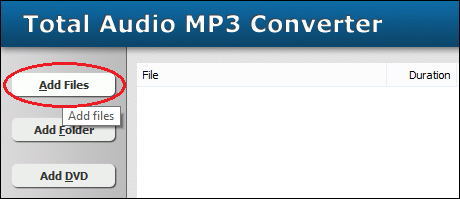
Click "Add Files" to choose AMR files and then add them
to conversion list.
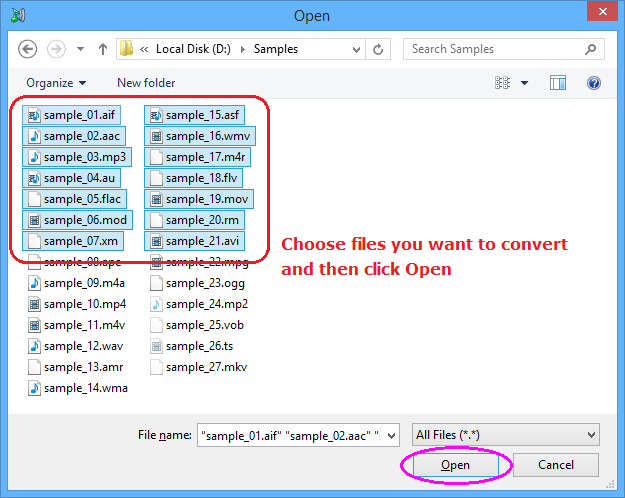
Choose one or more AMR files you want to convert and then click Open.
- Choose "to AIFF"
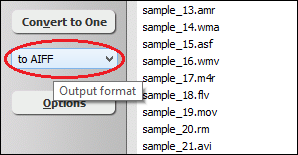
- Convert AMR to AIFF
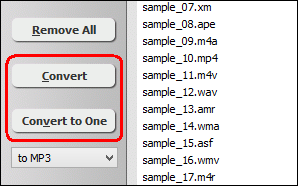
Click on "Convert" to convert AMR files to AIFF format; alternatively,
click on "Convert to One" to convert all files in list and
combine to a single one AIFF file.

The software is converting AMR files to AIFF format.
- Play and Browse AIFF File
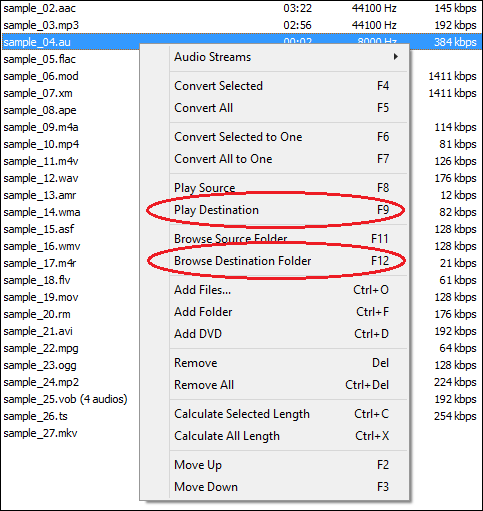
When conversion completes, you could right-click on converted file and choose
"Play Destination" to play the AIFF file; or choose "Browse
Destination Folder" to open Windows Explorer to browse the outputted AIFF
file.
Top
AMR to AIFF Converter is 100% clean and safe to install.
It's certified by major download sites.

AMR to AIFF Related Topics:
|

